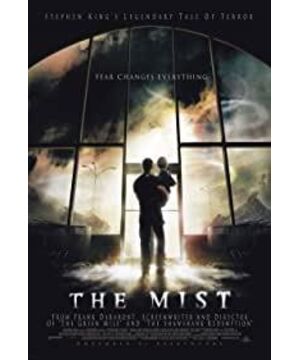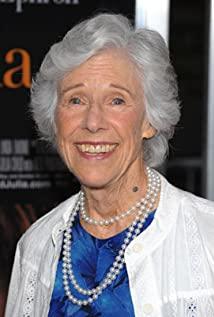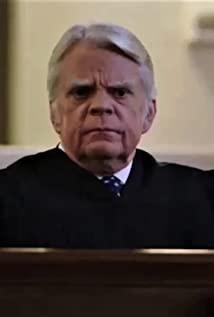This is a cry of split lung hiss! ! !
This is a horn to escape! ! !
This is an anthem of despair in the end! ! !
In recent months, in the vast BT resources, I have downloaded so many movies, searched and searched, and finally found such a one, which made me cool, scared me, shocked me, and crashed me!
THE MIST, the mist, a good name. The title of science fiction thriller horror movie metamorphosis should be so simply. THE ABYSS, THE TERMINATOR, THE MATRIX, THE PRESTIGE. This time, it is THE MIST.
Frank Drapant, the ace fan spokesperson of the master of horror Stephen King, gave us a meal of worms for appetizers, monsters for dinner, blood plasma for alcohol, and amputated limbs for dessert. The name of the dish is "despair".
I want to analyze "The Mist" from many places, and there are too many details for us to ponder-but any entry point is not as easy as starting from the end, because it is this hailed as the most shocking ending of 2007, let me find it The thrill of watching "The Seven Deadly Sins", watching "Shawshank's Redemption", watching "Small Island Cry", and watching "Devil Struggle"! Observing the reactions of comrades on the Internet, the discussion of "The Mist" basically revolves around the core question: What does the end of this TMD bird mean?
When David killed four people, including his beloved son, in despair, and watched the tanks drive by with their teeth and claws blankly, in the big vision of the ending like our motherland’s "Fighting", he collapsed. A second ago, he and I asked the same ultimate question: Heaven, earth, what is all this?
Why why why why? What do you want to express? Who can answer me? ? ?
A secret room with a closed door, we lack a key.
It stands to reason that there is no more self-slapped ending than this. This is naturally a subverted hero. There are many heroes that have been subverted in various movies, and we are usually happy to see heroes being ravaged, but no anti-hero ending can arouse us so much discomfort like this David’s ending. Only this hero was mocked so thoroughly, and before he was mocked, we all believed and depended on him incomparably (under the premise of the movie's outstanding desperate atmosphere, who can we rely on besides relying on David?), In other words, we were ridiculed so unbearably together. This is the real reason for our unhappiness: we have been fooled mercilessly.
Why didn't we expect this ending? First, David is the protagonist, and he is blessed by the Buddha. Second, in several adventures, we can basically agree with David’s values, judgment and behavior (although the director has laid the groundwork for David’s other side, but only the second time can we perceive the director’s critical intentions. This will be discussed later), I think he is the only good and smart person, who is unhappy in the ending? Third, our imagination is not enough.
The key is touched, the secret room is too dark, we lack a beam of light.
The theme of "The Mist" talks about an emotion, and this emotion is called "despair." Once I watched the BBC Human Science series and said that a humanist divided human expressions into six categories: joy, anger, sadness, fear, disgust, and surprise. Despair is not among them, so despair is not our constant emotion. Have you been truly desperate? Although we are very familiar with the term "despair", our understanding of "despair" is actually very shallow. What is despair? What is the psychological basis for the ultimate despair? After watching "The Mist", I thought hard and couldn't help it. It wasn't until yesterday that the ghostly thought of another real person in Chinese history, that the ending of "The Mist" suddenly became clear! ! !
This person is a famous figure in the modern history of China. He has a good-looking but pure heart, and is known as the "Mr. Taoist" among revolutionaries; he has a firm belief in revolution, has followed Sun Yat-sen in revolutionary activities for many years, and has become one of Sun's most trusted cronies; he was once a backbone member of the Tongmenghui, and went there in person. Beijing assassinated a senior official of the Qing government, but was arrested before he was arrested. He generously chanted the poem "Success with a knife and live up to his youth". He was hailed as the most generous and moving prison song in modern Chinese history. Later, he had a very high status in the National Government, 918 After the incident, he stood on the same front with the demonstrators, opposed Chiang Kai-shek's inaction, and advocated a thorough anti-Japanese and national salvation... So who is this person?
Wang Jingwei.
When the light came, our blurred eyes realized that we had touched the wrong key.
After "Lust, Caution", the society has paid more attention to the Wang Puppet government. In the divergent historical theory, there is such a speculation that is more credible: Wang Jingwei is desperate. He did not believe that the Chinese were capable of resisting the Japanese devils with "disparity in strength", so he suddenly changed from the main battle faction to the master and peace faction. Only the word "despair" can explain the historical farce of the hero suddenly turning into a clown. The total desperation made everyone think that the most unlikely traitor to the country was completely betrayed.
Looking at "The Mist" from this angle, I feel that David is terribly real! This weird ending has also changed from seemingly logically unreasonable to extremely natural. In the first 95% of the film, he not only never gave up hope, but also encouraged others to survive; he not only cared for the weak with compassion, but also took the lead in saving others with practical actions. Attention, it is this kind of "sage", the more he says "don't give up, don't give up", the more desperate he will give up completely and simply! Carefully analyze the many details of David’s behavior throughout the article: he did not take the painting into the basement; he promised his wife would come back and broke his promise; he promised not to leave his son and also broke his promise; he refused to help the first mother who left the supermarket (she again It was precisely the first rescued we saw); he once beat the strange bird on fire and ignored the call of his beloved son; the first night he took the lead in illuminating the locusts with emergency lights (but attracted more locusts); Of course, in the end, there are 4 lives...The so-called man is not perfect, he has both a selfish side and a blind side, but these negative details are discussed in a large number of Lei Feng-like behaviors, and we unconsciously ignore them. Based on his performances, he just imagined him as the true savior. From the perspective of Zhuge Liang, it was his blind self-confidence that brought him and his followers to the abyss of immortality, and he was not much better than the religious lunatic. The belief that he had always supported, ended in seeing a super giant monster several times higher than the jeep, shattered and messy in the wind. His logic that he always adhered to gave him the same wrong answer at this time: Give up. As a result, he took the lead and became the only (note, the only) person who gave up the hope of his own life. At that time, he was worthy of sympathy, but not worthy of respect. While giving up the hope of life, he gave up the nobility of being a human being. At this time, he was worse than the child caught by the tentacle. At least the child was to survive. Struggle to the end.
"The Mist" is a movie that does not give people the slightest sense of security, and it is also a movie that firmly does not provide the correct answer. The people inside guide themselves in accordance with the four major behavior patterns of "scientific reason", "paranoid reason", "love attachment", and "religious fanaticism", giving themselves a touch of comfort in the endless fog. We first thought that "love attachment" was wrong, we thought that the mother who walked into the fog at first would definitely die; we then thought that "paranoid reason" was wrong, we thought that black lawyers were to blame; we especially thought that "religious fanaticism" It is also wrong. We think that the mad woman is more than guilty; we always think that "scientific reason" is really correct. We even thought that suicide with a pistol is a dignified, decent, noble, and sensible way of death... In the carefully arranged mist, not only the people in the play, but also our outsiders have lost their direction and judgment. I was lost, so I was fooled, no one can blame others, only my own level is not high. "Mist" is not responsible for providing answers. Steven King or De Labont don't want to tell you which line you should stand on to ensure you survive, they just tell you that this is reality. Reality! Reality! Are we all lost in our own fog?
In addition to the terrifying ending, the overall rhythm of "The Mist" is also remarkable, with fast entry into the play, clear paragraphs, straightforward character introduction, rapid development of the plot, sound effects in place, and the DV handheld, shaking, and jerky shooting style. The effect is outstanding, and it has also contributed to "Strange Type" (poster), "Alien" (captive human reproduction and strong acid body fluids), "Fatal ID" (blood handprint), "LOST" (fragmented group portrait of the affected people), "King Kong" (tentacles) A tribute to old and new classics such as He Chong) and "Extreme Chill" (Tentacles), showing De La Bonte's solid foundation and taste preference.
Also, I love those disgusting bugs, tentacles and strange animals. Especially tentacle, 80% of the desperate effect of this film can be attributed to them, which is more disgusting than "King Kong", very good! ! !
View more about The Mist reviews











